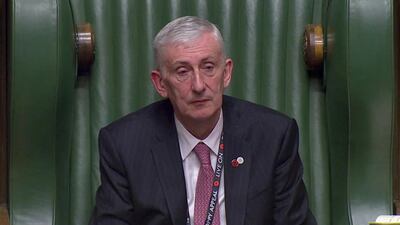British Parliament on Monday voted for Lindsay Hoyle as its new Speaker to replace the influential but controversial John Bercow.
Mr Hoyle's role will be to run the daily business of the Commons, keeping politicians in line with robust cries of "order".
The favourite beat Chris Bryant by 112 votes in the fourth and final round, having already beaten Dame Eleanor Laing, Harriet Harman, Dame Rosie Winterton, Sir Edward Leigh and Meg Hillier in earlier rounds.
Mr Hoyle has held six ministerial positions and is a member of the opposition Labour party. Widely respected across the House, he is a popular, yet uncontroversial choice.
After winning the vote, Mr Hoyle said he would "change the House for the better".
Prime Minister Boris Johnson said he was looking forward to the new Speaker bringing his "signature kindness and reasonableness to proceedings".
In a parting shot at Mr Bercow, Mr Johnson said he looked forward to having an "impartial" speaker in the Commons.
Mr Bercow retired last week after a decade as House Speaker that saw him become a central player in Britain's Brexit drama.
Some politicians want to see a more cautious approach than that taken by Mr Bercow, who prided himself on making the government answerable to Parliament.
The Speaker is supposed to be an impartial arbiter of Parliament's rules, but critics accused him of favouring anti-Brexit politicians at the expense of those who support leaving the EU.
The candidates were each given five minutes to address politicians before Monday's secret vote commenced.
During each round of voting, the lowest-placed contender dropped out until one candidate secured majority support.
The vote will probably be the last major decision of this Parliament before it is dissolved on Wednesday before the December 12 election.
Britain is gearing up for an early election in which all 650 seats in the House of Commons are up for grabs.
Mr Johnson's Conservatives are hoping to win a majority that could unblock Britain's political deadlock and let him fulfil his pledge to take Britain out of the EU.
The opposition Labour party is trying to shift the campaign's focus from Brexit to domestic political issues such as schools, health care and Britain's social inequities.
The centrist Liberal Democrats, who want to cancel Brexit, and the single-issue Brexit Party are battling for voters with strong views on whether the UK should leave the 28-nation EU.


